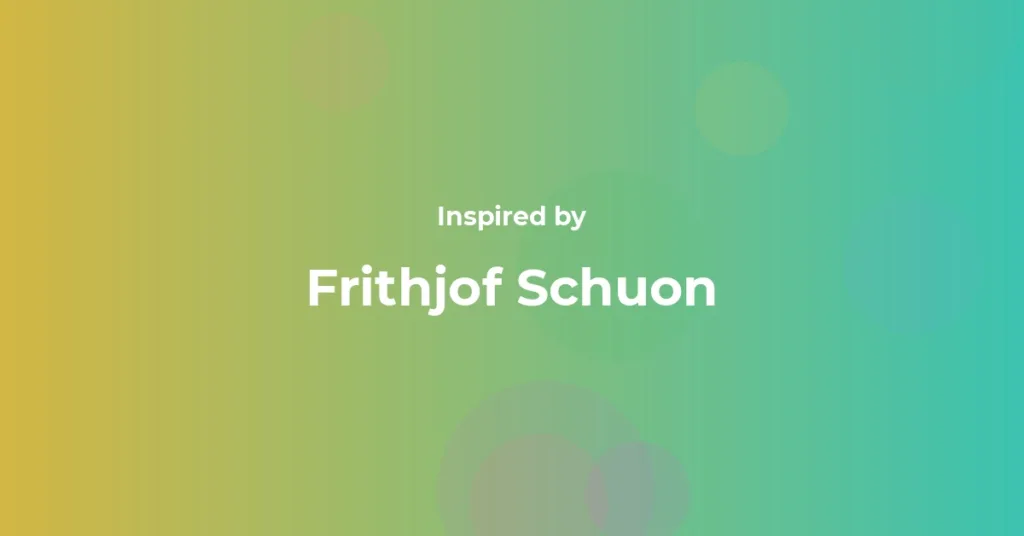
Frithjof Schuon Famous Quotes and Affirmations
Frithjof Schuon (1907-1998) was a Swiss philosopher, metaphysician, and spiritual thinker, widely regarded as one of the foremost exponents of the Perennial Philosophy. His profound insights into the nature of religion, spirituality, and metaphysics have inspired countless individuals seeking a deeper understanding of universal truths. Schuon’s works emphasize the transcendent unity of religions, advocating for an esoteric perspective that transcends dogmatic boundaries. His intellectual legacy bridges Eastern and Western traditions, offering a unique synthesis of mystical thought. This article explores Schuon’s most impactful ideas, verified quotes from his original writings, and affirmations inspired by his philosophy. Through his extensive body of work, Schuon invites readers to contemplate the eternal principles that underlie all authentic spiritual paths, making his contributions timeless and relevant in today’s diverse world.
Frithjof Schuon Best Quotes
Below are verified quotes from Frithjof Schuon’s original works, each accompanied by precise citations to ensure authenticity and scholarly integrity:
- “Truth is the reason for man’s existence; it is at once his origin and his end.” – Frithjof Schuon, The Transcendent Unity of Religions (1953), p. 3
- “The very notion of religion implies that there are two poles, God and man, and that there is a relationship between them.” – Frithjof Schuon, Understanding Islam (1963), p. 1
- “Beauty is a reflection of divine perfection; it is a theophany.” – Frithjof Schuon, Esoterism as Principle and as Way (1970), p. 115
- “The purpose of esoterism is to enable man to return to his divine origin.” – Frithjof Schuon, The Eye of the Heart (1997), p. 7
- “The world is a veil which both hides and reveals God.” – Frithjof Schuon, Light on the Ancient Worlds (1965), p. 23
We recommend the following books for self improvement:

365 (+1) Affirmations to Supercharge Your Life
The one-of-a-kind program contained in this affirmation book, adorned with beautiful and colorful artworks, is meticulously designed to be wholeheartedly embraced by your subconscious mind, enabling you to manifest the life you desire.
Buy on Amazon
Small Habits Revolution: 10 Steps To Transforming Your Life Through The Power Of Mini Habits
If you're frustrated by failed attempts to adopt new habits, there's good news. The solution is within your grasp. This fast-moving guide provides actionable advice that will help you to make positive, purposeful, lasting changes in your life.
Buy on Amazon
Embrace What You Can’t Change
"Embrace What You Can’t Change" by the insightful duo Ahiranta Rinpoche and Ozay Rinpoche is a transformative guide that invites readers to navigate the complexities of life with grace and acceptance.
Buy on Amazon
We Can Do Better: A Self-Help Book for People Who Are Tired of Self-Help Books
We Can Do Better isn’t another book telling you to hustle harder or wake up at 5 a.m. It’s not about fixing yourself — it’s about finally giving yourself permission to stop performing and start feeling human again.
Buy on Amazon
The P.R.I.M.E.R. Goal Setting Method
Amazon bestselling author Damon Zahariades provides a clear, concise, and actionable system for accomplishing anything you set out to do. You'll learn how to approach goal setting in a way that practically guarantees success. Along the way, you'll experience a massive boost in self-confidence. After achieving goal after goal, you'll begin to anticipate success as a foregone conclusion.
Buy on AmazonThis post contains affiliate links. As an Amazon Associate, we earn from qualifying purchases at no additional cost to you.
Famous Frithjof Schuon Aphorisms
Schuon’s concise and profound aphorisms distill his metaphysical insights into memorable expressions. Below are verified aphorisms with exact citations:
- “To know is to be.” – Frithjof Schuon, Logic and Transcendence (1975), p. 45
- “Truth and beauty are one.” – Frithjof Schuon, The Play of Masks (1992), p. 12
- “The heart sees what the mind cannot grasp.” – Frithjof Schuon, Gnosis: Divine Wisdom (1959), p. 33
Affirmations Inspired by Frithjof Schuon
These 50 affirmations are inspired by Frithjof Schuon’s teachings on spirituality, metaphysics, and the unity of religious traditions. They aim to reflect his emphasis on inner transformation and the pursuit of divine truth:
- I seek the eternal truth that unites all paths.
- My heart is open to the divine presence in all things.
- I embrace the unity behind apparent diversity.
- Every moment is an opportunity to reflect on the sacred.
- I am guided by the light of universal wisdom.
- My soul yearns for the divine origin of all being.
- I see beauty as a mirror of divine perfection.
- I strive to transcend the illusions of the material world.
- My life is a journey toward spiritual awakening.
- I honor the sacred essence in every tradition.
- I am attuned to the voice of eternal truth.
- My mind seeks clarity through divine contemplation.
- I find peace in the unity of all religions.
- I am a seeker of the hidden wisdom within.
- My spirit is connected to the infinite source.
- I embrace the mystery of existence with reverence.
- I see the world as a veil of divine revelation.
- My purpose is to return to the divine essence.
- I cultivate inner stillness to hear the sacred.
- I am grounded in the timeless principles of truth.
- My heart reflects the beauty of the divine.
- I am open to the lessons of every spiritual path.
- I seek harmony between the outer and inner worlds.
- My life is a prayer for divine understanding.
- I trust in the unseen wisdom that guides me.
- I am a vessel for universal love and truth.
- My soul resonates with the eternal harmony.
- I release attachment to fleeting illusions.
- I am drawn to the light of divine knowledge.
- My spirit is nourished by sacred contemplation.
- I honor the divine spark within every being.
- I seek to align my will with the divine order.
- My journey is guided by the quest for truth.
- I am at peace with the mystery of the divine.
- I embrace the interconnectedness of all life.
- My heart is a sanctuary for spiritual insight.
- I am inspired by the eternal wisdom of the ages.
- I seek to embody the unity of all existence.
- My mind is a mirror for divine reflection.
- I am committed to the path of inner transformation.
- I find strength in the timeless truths of the spirit.
- My life reflects the beauty of divine creation.
- I am open to the divine messages in every moment.
- I cultivate a heart of gratitude for the sacred.
- My soul is anchored in the eternal now.
- I seek to understand the divine through humility.
- I am a seeker of the universal light within.
- My spirit is uplifted by the pursuit of truth.
- I embrace the divine unity that binds all hearts.
- My life is a testament to the power of spiritual insight.
Main Ideas and Achievements of Frithjof Schuon
Frithjof Schuon, born on June 18, 1907, in Basel, Switzerland, emerged as one of the most influential thinkers in the field of comparative religion and metaphysics during the 20th century. His intellectual contributions are deeply rooted in the Perennial Philosophy, a perspective that posits the existence of universal truths underlying all major religious traditions. Schuon’s work is characterized by a profound commitment to the idea that beneath the apparent differences in religious doctrines and practices lies a shared esoteric core—a transcendent unity that reflects the divine origin of all authentic spiritual paths. This central thesis became the cornerstone of his philosophical output and positioned him as a leading voice in the study of religious esoterism.
Schuon’s early life was marked by a deep interest in spirituality and metaphysics, influenced by his exposure to both Christianity and the broader currents of European intellectual thought. At a young age, he immersed himself in the works of Plato, Plotinus, and other classical thinkers, which shaped his understanding of metaphysical principles. His encounter with the writings of René Guénon, a French metaphysician, proved to be a turning point in his intellectual development. Guénon’s emphasis on tradition and the critique of modernity resonated deeply with Schuon, leading him to explore the spiritual traditions of the East, particularly Islam, Hinduism, and Buddhism. This exploration culminated in Schuon’s formal initiation into a Sufi order in Algeria in 1932, an experience that profoundly shaped his worldview and writings. His adoption of Islam, while maintaining a universalist outlook, underscored his belief in the necessity of grounding metaphysical inquiry in lived spiritual practice.
One of Schuon’s most significant achievements was his articulation of the concept of the “transcendent unity of religions,” which he elaborated in his seminal work of the same title, published in 1953. In this book, Schuon argues that all major religions share a common esoteric essence, despite their exoteric differences. He posits that while the external forms of religious practice—such as rituals, laws, and dogmas—may vary, the inner, mystical dimension of each tradition points to the same ultimate reality. This perspective was groundbreaking at a time when religious studies often focused on comparative differences rather than unifying principles. Schuon’s work challenged the prevailing materialist and reductionist approaches to religion, advocating instead for a deeper understanding of the spiritual truths that connect humanity across cultures and epochs.
Schuon’s intellectual framework was not limited to theoretical exposition; it was also deeply personal and experiential. He believed that true metaphysical understanding required direct participation in a spiritual tradition. His own life exemplified this principle, as he lived according to the practices of Sufism while maintaining a profound respect for other religious paths. This balance between personal commitment and universalist insight allowed Schuon to write with authority on a wide range of traditions, including Christianity, Islam, Hinduism, Buddhism, and indigenous spiritualities. His ability to synthesize these diverse perspectives without reducing them to mere syncretism is a testament to his intellectual rigor and spiritual depth.
Another key idea in Schuon’s philosophy is the distinction between the exoteric and esoteric dimensions of religion. He argued that the exoteric level—comprising outward forms and practices—serves as a necessary foundation for the masses, providing structure and moral guidance. However, for those inclined toward deeper contemplation, the esoteric dimension offers a path to direct knowledge of the divine. Schuon emphasized that esoterism is not a rejection of exoterism but rather its fulfillment, as the inner truth illuminates the outer form. This nuanced understanding allowed him to navigate the tensions between religious orthodoxy and mystical insight, offering a framework that respected both the letter and the spirit of tradition.
Schuon’s critique of modernity is another central theme in his work. He viewed the modern world as characterized by a loss of spiritual center, driven by materialism, secularism, and the rejection of traditional wisdom. In books like Light on the Ancient Worlds (1965), he contrasted the spiritual richness of pre-modern societies with the alienation of contemporary life, urging a return to sacred principles. However, Schuon’s critique was not merely reactionary; it was rooted in a positive vision of reintegrating metaphysical truths into human consciousness. He believed that the crises of modernity—whether social, environmental, or existential—could only be addressed through a renewed awareness of the divine order that governs existence.
Schuon’s achievements extend beyond his philosophical contributions to include his role as a spiritual guide. As the leader of a Sufi order in the West, he provided guidance to a small but dedicated group of followers, emphasizing the importance of prayer, meditation, and adherence to sacred principles. His personal example of humility, discipline, and devotion inspired those who knew him, reinforcing the idea that intellectual understanding must be complemented by spiritual practice. Schuon’s ability to embody the principles he taught made him a rare figure in the realm of philosophical and religious thought, bridging the gap between theory and lived experience.
In addition to his written works, Schuon’s influence can be seen in the broader revival of interest in traditionalist thought during the 20th century. Alongside figures like René Guénon and Ananda Coomaraswamy, Schuon contributed to a movement that sought to preserve and reinterpret the wisdom of ancient traditions in the face of modern challenges. His writings have been translated into numerous languages, reaching a global audience and inspiring scholars, spiritual seekers, and practitioners alike. While his ideas were sometimes controversial—particularly his insistence on the necessity of traditional forms in an age of individualism—they have nonetheless left an indelible mark on the study of religion and metaphysics.
Schuon’s extensive bibliography, which includes over 20 books and numerous articles, reflects the depth and breadth of his intellectual engagement. His works cover a wide range of topics, from the nature of divine reality to the symbolism of sacred art, the role of beauty in spirituality, and the challenges of interfaith dialogue. Each text is marked by a clarity of thought and a poetic quality that makes complex metaphysical concepts accessible to a broader audience. Schuon’s ability to distill profound ideas into lucid prose is one of the reasons his writings continue to resonate with readers today.
Schuon’s legacy is also evident in the way his ideas have influenced contemporary discussions on spirituality and religious pluralism. At a time when interfaith dialogue often struggles with superficiality or relativism, Schuon’s emphasis on the shared esoteric core of traditions offers a rigorous framework for mutual understanding. His insistence on the importance of authenticity—rooting oneself in a specific tradition while recognizing the validity of others—provides a model for navigating the complexities of religious diversity in the modern world.
Throughout his life, Schuon remained committed to the pursuit of truth, beauty, and goodness, which he saw as inseparable aspects of the divine. His philosophy encourages individuals to look beyond the surface of religious differences and to seek the eternal principles that unite humanity in its quest for meaning. Schuon’s work challenges readers to cultivate a contemplative attitude, to approach life with reverence, and to recognize the sacredness of existence itself. In this sense, his contributions are not only intellectual but also deeply transformative, inviting a reorientation of the self toward the divine.
In his later years, Schuon continued to write and reflect on the spiritual challenges of the modern age, even as he withdrew from public life. After moving to the United States in 1980, he settled in Bloomington, Indiana, where he lived quietly until his death on May 5, 1998. His final works, such as The Eye of the Heart (1997), reveal a continued preoccupation with the themes that defined his career: the nature of divine knowledge, the role of tradition, and the path to spiritual realization. Schuon’s life and work stand as a testament to the enduring relevance of metaphysical inquiry in an era often marked by skepticism and fragmentation.
Magnum Opus of Frithjof Schuon
Frithjof Schuon’s magnum opus is widely considered to be The Transcendent Unity of Religions, first published in French in 1948 and later in English in 1953. This seminal work encapsulates the core of Schuon’s philosophical vision and remains one of the most influential texts in the field of comparative religion and perennial philosophy. Spanning approximately 200 pages in its English edition, the book articulates Schuon’s central thesis: that all authentic religious traditions, despite their apparent differences, share a common esoteric essence that points to the same ultimate reality. This idea, while not entirely new, was presented by Schuon with unparalleled clarity and depth, making the book a cornerstone of traditionalist thought and a profound contribution to the study of spirituality.
The structure of The Transcendent Unity of Religions is both systematic and accessible, reflecting Schuon’s ability to distill complex metaphysical concepts into a coherent framework. The book begins with an introduction to the concept of religion itself, defining it as a relationship between humanity and the divine. Schuon argues that this relationship is expressed through two primary dimensions: the exoteric, which encompasses outward forms such as rituals and doctrines, and the esoteric, which pertains to inner, mystical knowledge. He posits that while exoteric differences create the diversity of religious traditions, the esoteric dimension reveals their underlying unity. This distinction serves as the foundation for the book’s exploration of how various religions—particularly Christianity, Islam, Hinduism, and Buddhism—manifest the same transcendent truth in different forms.
One of the key arguments in the book is that religious diversity is not a sign of contradiction but rather a reflection of divine wisdom. Schuon suggests that the multiplicity of religious paths is necessary to address the varied needs and temperaments of humanity. Each tradition, he contends, is a “ray” emanating from the same divine source, adapted to the cultural and historical context in which it arises. This perspective challenges both religious exclusivism, which claims sole possession of truth, and secular relativism, which dismisses the absolute nature of spiritual reality. Schuon’s nuanced approach offers a middle path, affirming the validity of each tradition while emphasizing the universal principles that unite them.
Schuon’s discussion of esoterism is particularly significant in The Transcendent Unity of Religions. He describes esoterism as the “heart” of religion, the dimension through which the individual transcends the limitations of form and attains direct knowledge of the divine. While exoterism provides the necessary structure for communal religious life, esoterism offers a path for those seeking a deeper, more personal encounter with the sacred. Schuon is careful to note that esoterism does not negate exoterism; rather, it complements and fulfills it. This balance is a recurring theme in the book, reflecting Schuon’s broader commitment to honoring both the letter and the spirit of tradition.
The book also addresses the challenges of interfaith understanding in the modern world. Schuon critiques the superficial approaches to religious dialogue that often reduce traditions to their lowest common denominator or ignore their deeper metaphysical content. Instead, he advocates for a dialogue rooted in the recognition of shared esoteric truths, which he believes can foster genuine mutual respect. This aspect of the book remains highly relevant today, as societies grapple with the complexities of religious pluralism and the need for authentic communication across cultural divides.
Another notable feature of The Transcendent Unity of Religions is Schuon’s engagement with specific religious traditions. He devotes sections of the book to analyzing the esoteric dimensions of Christianity, Islam, and Hinduism, among others, demonstrating how each tradition reflects the same universal principles in its unique way. For example, he explores the concept of the Logos in Christianity as analogous to the principle of divine manifestation in other traditions, while highlighting the role of gnosis in Islamic Sufism as a path to direct knowledge of God. Schuon’s ability to draw these parallels without reducing traditions to mere equivalents is a testament to his scholarly depth and spiritual insight.
The prose style of the book is another factor in its enduring impact. Schuon writes with a clarity and elegance that make profound ideas accessible to a wide audience. His language often carries a poetic quality, reflecting his belief in the inseparability of truth and beauty. This aesthetic dimension adds to the book’s appeal, inviting readers not only to understand his arguments intellectually but also to feel their spiritual resonance. Schuon’s ability to combine rigorous analysis with a contemplative tone is one of the reasons The Transcendent Unity of Religions continues to inspire both scholars and spiritual seekers.
The historical context in which the book was written also enhances its significance. Published in the aftermath of World War II, at a time of global upheaval and ideological conflict, The Transcendent Unity of Religions offered a vision of unity and reconciliation. Schuon’s emphasis on the shared spiritual heritage of humanity served as a counterpoint to the divisiveness of the era, proposing a framework for understanding that transcended national, cultural, and religious boundaries. This message resonated with readers seeking meaning in a fractured world and contributed to the book’s lasting influence.
Critically, The Transcendent Unity of Religions has been both praised and debated within academic and spiritual circles. Some scholars have lauded Schuon’s ability to synthesize diverse traditions into a coherent metaphysical framework, viewing the book as a groundbreaking contribution to comparative religion. Others have questioned his approach, particularly his reliance on the concept of esoterism, which some argue is not equally prominent in all traditions. Despite these debates, the book remains a foundational text for those interested in the Perennial Philosophy and the study of religious unity.
In the broader context of Schuon’s oeuvre, The Transcendent Unity of Religions serves as the cornerstone of his intellectual legacy. It introduces many of the themes that he would explore in greater depth in later works, such as the nature of divine knowledge, the role of beauty in spirituality, and the critique of modernity. The book also reflects Schuon’s personal journey as a thinker and practitioner, embodying his commitment to both intellectual inquiry and lived spiritual experience. As such, it stands as a testament to his vision of a world in which the diversity of religious forms is harmonized by the recognition of their shared divine origin.
Interesting Facts About Frithjof Schuon
Frithjof Schuon’s life and work are marked by a number of fascinating details that illuminate his unique position as a philosopher, metaphysician, and spiritual guide. Born on June 18, 1907, in Basel, Switzerland, Schuon grew up in a culturally rich environment that exposed him to a variety of intellectual and spiritual influences from an early age. His father, a violinist, and his mother, of Alsatian descent, provided a nurturing backdrop for his early curiosity about the arts and philosophy, which would later inform his holistic view of beauty and truth as inseparable aspects of the divine.
One intriguing aspect of Schuon’s early life is his precocious interest in metaphysics. As a teenager, he immersed himself in the works of ancient philosophers like Plato and Plotinus, as well as medieval Christian mystics. This self-directed study laid the groundwork for his later engagement with the Perennial Philosophy. By the age of 16, Schuon had already begun to formulate ideas about the unity of spiritual traditions, a theme that would define his career. His early intellectual independence is a testament to his innate drive to seek answers to life’s deepest questions.
Schuon’s encounter with the writings of René Guénon in the 1920s was a pivotal moment in his life. Guénon, a French metaphysician and critic of modernity, became a significant influence on Schuon, shaping his understanding of tradition and esoterism. The two later met in person and maintained a correspondence, though their relationship was not without tension due to differing views on certain spiritual matters. This intellectual connection highlights Schuon’s place within the broader traditionalist movement, a school of thought that sought to revive the wisdom of ancient traditions in the face of modern secularism.
Another remarkable fact about Schuon is his initiation into a Sufi order in Algeria in 1932. At the age of 25, he traveled to Mostaganem, where he was initiated by Sheikh Ahmad al-Alawi, a renowned Sufi master. This experience marked a profound turning point, as Schuon embraced Islam and adopted the name Isa Nur al-Din Ahmad. His commitment to Sufism did not, however, limit his appreciation for other traditions; rather, it deepened his conviction that all authentic paths lead to the same divine reality. Schuon’s ability to live within a specific tradition while maintaining a universalist perspective is one of the defining features of his life and thought.
Schuon was also an accomplished artist and poet, though this aspect of his life is less widely known. He created numerous paintings and drawings, often inspired by Native American and other indigenous traditions, reflecting his belief in the sacredness of beauty. His poetry, written in German and French, similarly expresses his spiritual insights in a lyrical form. These creative pursuits were not mere hobbies but integral to his philosophy, as he viewed art as a theophany—a manifestation of divine perfection. This multidimensional approach to spirituality sets Schuon apart from many of his contemporaries.
In 1980, Schuon relocated to the United States, settling in Bloomington, Indiana, where he spent the final decades of his life. This move was motivated by a desire for a quieter existence, away from the public eye, allowing him to focus on writing and spiritual practice. His home became a center for a small community of followers, who sought his guidance as a Sufi sheikh. Schuon’s decision to live in relative seclusion in his later years reflects his emphasis on inner contemplation over external recognition, a principle that permeated his teachings.
Schuon’s linguistic abilities were another noteworthy aspect of his life. Fluent in several languages, including German, French, English, and Arabic, he was able to engage directly with sacred texts and traditions in their original forms. This proficiency allowed him to offer nuanced interpretations of religious concepts, free from the distortions often introduced by translation. His multilingualism also facilitated his role as a bridge between Eastern and Western thought, enabling him to communicate complex ideas to diverse audiences.
Despite his profound contributions to philosophy and spirituality, Schuon remained a private and humble figure throughout his life. He avoided public speaking and rarely sought attention for his work, preferring to let his writings speak for themselves. This reticence is consistent with his belief that true spiritual knowledge is not a matter of external display but of inner transformation. Schuon’s personal demeanor thus mirrored the principles he espoused, embodying a quiet dedication to the pursuit of divine truth.
Daily Affirmations that Embody Frithjof Schuon Ideas
These daily affirmations are crafted to reflect Frithjof Schuon’s core ideas about spirituality, unity, and the pursuit of divine truth. They are designed for personal reflection and inspiration:
- I begin each day seeking the eternal truth within.
- I honor the divine presence in every tradition I encounter.
- My heart is open to the unity that underlies all differences.
- I approach life with reverence for the sacred mystery.
- I strive to see beauty as a reflection of divine perfection.
- My soul is guided by the timeless wisdom of the spirit.
- I release attachment to illusions and seek the divine reality.
- I cultivate inner stillness to hear the voice of truth.
- My life is a journey toward spiritual awakening and unity.
- I trust in the divine order that shapes my path.
- I reflect on the interconnectedness of all existence daily.
- My mind is a mirror for divine contemplation and insight.
- I seek harmony between my outer actions and inner truth.
- I am grateful for the sacred lessons in every moment.
- My spirit is uplifted by the pursuit of eternal knowledge.
Final Word on Frithjof Schuon
Frithjof Schuon remains a towering figure in the realm of metaphysics and comparative religion, whose profound insights into the transcendent unity of spiritual traditions continue to inspire seekers of truth. His life’s work, encapsulated in seminal texts like The Transcendent Unity of Religions, offers a timeless framework for understanding the shared essence of humanity’s diverse religious paths. Schuon’s emphasis on the balance between exoteric form and esoteric depth challenges individuals to look beyond surface differences and to cultivate a contemplative approach to life. His personal commitment to spiritual practice, rooted in Sufism yet embracing universal principles, serves as a powerful example of lived philosophy. As the modern world grapples with division and materialism, Schuon’s vision of unity, beauty, and divine wisdom provides a beacon of hope and guidance. His legacy endures as an invitation to return to the sacred center of existence, reminding us that truth is not only to be known but to be lived.








